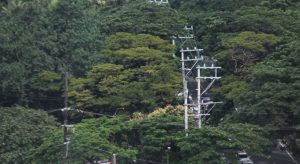ILOILO CITY — The Department of Energy (DoE) said it is seeking P72 billion for its total electrification program, and estimated the economic benefit of providing power to the entire country at P315 billion.
On the first day of the US Embassy’s 16th Media Seminar on Monday, Energy Undersecretary Rowena Cristina L. Guevara said that the estimate for the funds needed to achieve total electrification covers the period to 2028.
“A portion of that budget will be taken out of a loan because we already have a budget allocated for total electrification — around P3 billion to P5 billion per year,” Ms. Guevara said.
“So that’s around P25 billion, and we need P72 billion … so we might need to borrow because we have a deficit and the budget cannot increase suddenly,” she added.
She said that the DoE is in talks with the World Bank and the Asian Development Bank (ADB) for the loan. The program will seek to build distribution lines, electrify remote barangays and sitios, and install home solar systems.
Ms. Guevara said that the department presented the program and its economic benefits to the National Economic and Development Authority and the Department of Finance last week.
“We presented to them our request, and they seem to be happy about the numbers that came out of our study, particularly the economic benefits,” she said.
“Nobody reported (the estimated economic benefits) to them before. So, because of that, we’re thinking of a possible loan from ADB or the World Bank and thinking of government appropriations through the Department of Budget Management (DBM),” she added.
According to the study, giving low-income families access to up to eight hours of electricity a day will boost their income by 17.9%, while their expenditure is expected to increase by 17%.
If access to electricity were increased to eight hours to 16 hours per day, income and expenditure are expected to increase by 33.3% and 33%, respectively.
If low-income families are given access to electricity for 16 to 24 hours a day, their income and expenditure are projected to increase by 49.4% and 52.2%, respectively.
“If we are able to do total electrification, the economic benefit (of) P315 billion… (is equivalent to) 1.8% of our gross domestic product (GDP),” Ms. Guevara said.
“And the total electrification program is just P72 billion. If you invest that but get P315 billion back, wouldn’t that be a win?” she added.
According to Ms. Guevara, more than 2 million households currently have no access to electricity.
The DoE estimates the current household electrification rate at 93.12% at the end of March, while the target for this year is 94.83%.
President Ferdinand R. Marcos, Jr. said in his State of the Nation Address last year that the target is to achieve full household electrification by the end of his term. — Justine Irish D. Tabile
